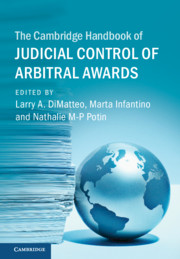Book contents
- The Cambridge Handbook of Judicial Control of Arbitral Awards
- The Cambridge Handbook of Judicial Control of Arbitral Awards
- Copyright page
- Dedication
- Concise Contents
- Contents
- Contributors
- Preface
- Part I Vacating Commercial Arbitration Awards
- Part II Enforcing Commercial Arbitration Awards
- Part III Scope and Interpretation of Arbitration Clauses
- Part IV Judicial Control of Arbitral Awards
- 10 Judicial Control of Arbitral Awards in Argentina
- 11 Judicial Control of Arbitral Awards in Australia
- 12 Judicial Control of Arbitral Awards in Bulgaria
- 13 Judicial Control of Arbitral Awards in Mainland China
- 14 Certain Aspects of Judicial Control of Arbitral Awards in France
- 15 Commercial Arbitration in Germany
- 16 Judicial Control of Arbitral Awards in Italy
- 17 Judicial Control of Arbitral Awards in Nigeria
- 18 Judicial Control of Arbitral Awards in Poland
- 19 Judicial Control of Arbitral Awards in Russia
- 20 Judicial Control of Arbitral Awards in Spain
- 21 Judicial Control of Arbitral Awards in Switzerland
- 22 Judicial Control of Arbitral Awards in Ukraine
- 23 Judicial Control of Arbitral Awards in the United Kingdom
- 24 Judicial Control of Arbitral Awards in the United States
- Part V Summary and Findings
13 - Judicial Control of Arbitral Awards in Mainland China
from Part IV - Judicial Control of Arbitral Awards
Published online by Cambridge University Press: 08 October 2020
- The Cambridge Handbook of Judicial Control of Arbitral Awards
- The Cambridge Handbook of Judicial Control of Arbitral Awards
- Copyright page
- Dedication
- Concise Contents
- Contents
- Contributors
- Preface
- Part I Vacating Commercial Arbitration Awards
- Part II Enforcing Commercial Arbitration Awards
- Part III Scope and Interpretation of Arbitration Clauses
- Part IV Judicial Control of Arbitral Awards
- 10 Judicial Control of Arbitral Awards in Argentina
- 11 Judicial Control of Arbitral Awards in Australia
- 12 Judicial Control of Arbitral Awards in Bulgaria
- 13 Judicial Control of Arbitral Awards in Mainland China
- 14 Certain Aspects of Judicial Control of Arbitral Awards in France
- 15 Commercial Arbitration in Germany
- 16 Judicial Control of Arbitral Awards in Italy
- 17 Judicial Control of Arbitral Awards in Nigeria
- 18 Judicial Control of Arbitral Awards in Poland
- 19 Judicial Control of Arbitral Awards in Russia
- 20 Judicial Control of Arbitral Awards in Spain
- 21 Judicial Control of Arbitral Awards in Switzerland
- 22 Judicial Control of Arbitral Awards in Ukraine
- 23 Judicial Control of Arbitral Awards in the United Kingdom
- 24 Judicial Control of Arbitral Awards in the United States
- Part V Summary and Findings
Summary
Mainland China has not adopted the UN Commission on International Trade Law (UNCITRAL) Model Law, nor has it permitted ad hoc arbitration. Yet, arbitration in China is developing rapidly. According to the data released by the Ministry of Justice on March 2019, at the end of 2018 there were 255 arbitration commissions established with more than 60,000 staff members in mainland China.1 The caseload of 2018 is 540,000, which was a 127 percent increase compared to that in 2017.2 The stakes involved in 2018 are around 700 billion RMB.3 Since the promulgation of the Chinese Arbitration Law (CAL) in 1994, domestic arbitral commissions have handled over 2.6 million cases involving more than seventy countries/regions.4 Additionally, judicial review of arbitration in China has undergone changes over the last decades. The Chinese Arbitration Law has gone through heated discussions of amendment, and the Supreme People’s Court’s (SPC) judicial interpretations have contributed significantly to the development of Chinese arbitration. With the acceleration of open-up policy and the implementation of the Belt and Road Initiative (BRI), China endeavors to elevate its international image by providing fair, transparent, and efficient judicial services for international dispute resolution. Judicial attitude toward arbitration becomes more open minded than ever before. In earlier days, foreign investors had little information on the prospects of enforceability of arbitral awards in mainland China. The uncertainty inevitably affected their decisions on whether to choose arbitration as a dispute resolution mechanism when doing business with Chinese counterparts.
Keywords
- Type
- Chapter
- Information
- The Cambridge Handbook of Judicial Control of Arbitral Awards , pp. 210 - 225Publisher: Cambridge University PressPrint publication year: 2020

